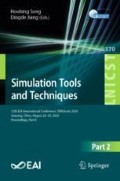Abstract
Similar to terrestrial networks where edge computing facilities have already been introduced to decrease the user request response delay and to reduce the backhaul bandwidth consumption, low earth orbit (LEO) satellite constellation networks can also be benefited by adopting edge computing technologies. The computation tasks generated by ground users can be offloaded to their accessing LEO satellites to enhance network QoS and user QoE. This paper focuses on modeling and simulating computation offloading at LEO constellation network edge. A one-dimensional networking model for edge computing enabled LEO constellation networks is derived, and on that basis, a Monte Carlo simulator is developed from scratch to evaluate system performance. As a case study, three different computation offloading schemes are elaborated and implemented on the simulator. Comparative evaluation experiments have been conducted and the results indicate that, in resource restricted scenarios, allowing computation offloading to the neighbors of the access satellites can considerably reduce the request blocking probability with only slightly increasing the average request response delay.
Access this chapter
Tax calculation will be finalised at checkout
Purchases are for personal use only
References
Lovelly, T.M., et al.: A framework to analyze processor architectures for next-generation on-board space computing. In: IEEE Aerospace Conference, pp. 1–10. IEEE, Big Sky (2014)
Flores, H., et al.: Mobile code offloading: from concept to practice and beyond. IEEE Commun. Mag. 53(3), 80–88 (2015)
Liu, J., et al.: Delay-optimal computation task scheduling for mobile-edge computing systems. In: 2016 IEEE International Symposium on Information Theory, pp. 1451–1455. IEEE, Barcelona (2016)
Wang, Q., et al.: Computation tasks offloading scheme based on multi-cloudlet collaboration for edge computing. In: 2019 Seventh International Conference on Advanced Cloud and Big Data, pp. 339–344. IEEE, Suzhou (2019)
Long, L., et al.: Delay optimized computation offloading and resource allocation for mobile edge computing. In: 2019 IEEE 90th Vehicular Technology Conference, pp. 1–5. IEEE, Honolulu (2019)
Kamoun, M., et al.: Joint resource allocation and offloading strategies in cloud enabled cellular networks. In: IEEE International Conference on Communications, pp. 5529–5534. IEEE, London (2015)
Wang, W., et al.: Computational offloading with delay and capacity constraints in mobile edge. In: IEEE International Conference on Communications, pp. 1–6. IEEE, Paris (2017)
Hao, Z., et al.: A delay and energy consumption efficient offloading algorithm in mobile edge computing system. In: 2019 IEEE 11th International Conference on Communication Software and Networks, pp. 251–257, Chongqing (2019)
Denby, B., et al.: Orbital edge computing: machine inference in space. IEEE Comput. Archit. Lett. 18(1), 59–62 (2019)
Cheng, N., et al.: Space/aerial-assisted computing offloading for IoT applications: a learning-based approach. IEEE J. Sel. Areas Commun. 37(5), 1117–1129 (2019)
Suzhi, C., et al.: Space edge cloud enabling network slicing for 5G satellite network. In: 15th International Wireless Communications & Mobile Computing Conference, pp. 787–792. IEEE, Tangier (2019)
Wang, Y., et al.: A computation offloading strategy in satellite terrestrial networks with double edge computing. In: IEEE International Conference on Communication Systems, pp. 450–455. IEEE, Chengdu (2018)
Wang, T.F., et al.: Computing as a service pattern based on edge computing. Appl. Electron. Technol. 45(5), 80–83 (2019)
Acknowledgement
This work is supported by the National Natural Science Foundation of China (Grant No. 61402085), the Science and Technology on Communication Networks Laboratory (Grant No. XX17641X011-03), and the 54th Research Institute of CETC.
Author information
Authors and Affiliations
Corresponding author
Editor information
Editors and Affiliations
Rights and permissions
Copyright information
© 2021 ICST Institute for Computer Sciences, Social Informatics and Telecommunications Engineering
About this paper
Cite this paper
Lai, J., Tan, H., He, M., Qu, Y., Zhong, L. (2021). Modeling and Simulation of Computation Offloading at LEO Satellite Constellation Network Edge. In: Song, H., Jiang, D. (eds) Simulation Tools and Techniques. SIMUtools 2020. Lecture Notes of the Institute for Computer Sciences, Social Informatics and Telecommunications Engineering, vol 370. Springer, Cham. https://doi.org/10.1007/978-3-030-72795-6_37
Download citation
DOI: https://doi.org/10.1007/978-3-030-72795-6_37
Published:
Publisher Name: Springer, Cham
Print ISBN: 978-3-030-72794-9
Online ISBN: 978-3-030-72795-6
eBook Packages: Computer ScienceComputer Science (R0)

